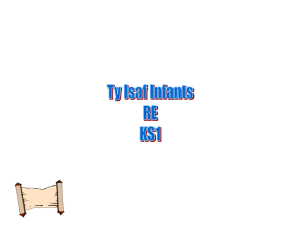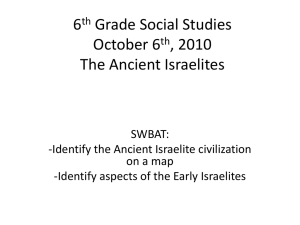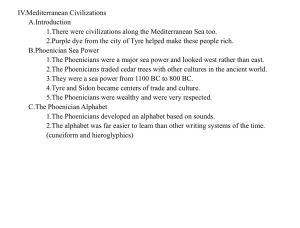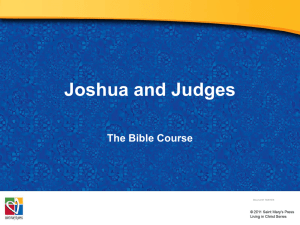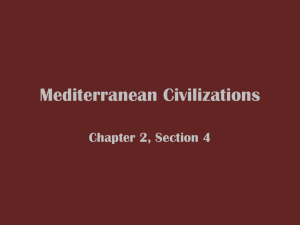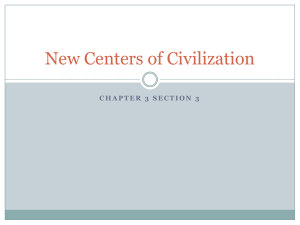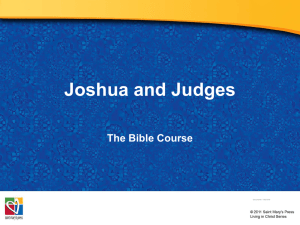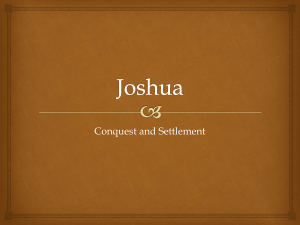The Early Israelites
advertisement
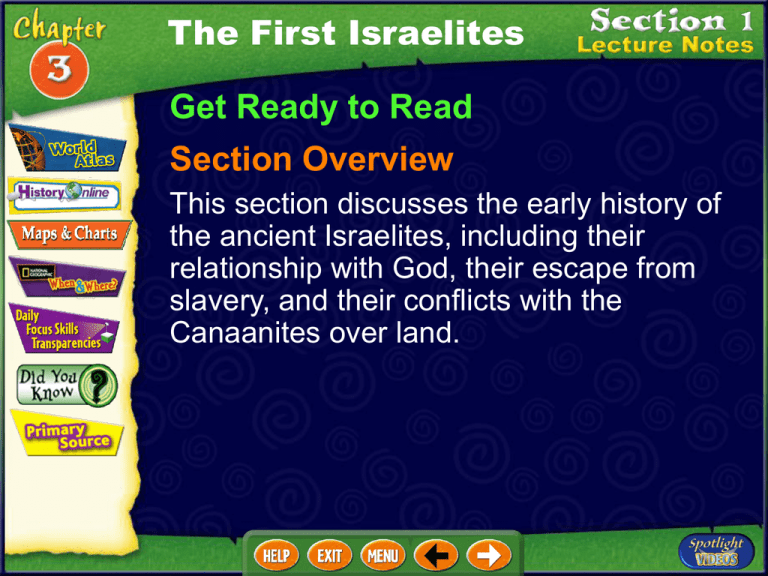
The First Israelites Get Ready to Read Section Overview This section discusses the early history of the ancient Israelites, including their relationship with God, their escape from slavery, and their conflicts with the Canaanites over land. The First Israelites Get Ready to Read (cont.) Focusing on the Main Ideas • The Israelites believed in one God who set down moral laws for his people. They recorded their history in the Bible. • The Israelites had to fight the Canaanites to return to their promised land. The First Israelites The Early Israelites • The Israelites built a kingdom in Canaan, along the Mediterranean Sea in southwest Asia, in 1000 B.C. • Today, Lebanon, Israel, and Jordan occupy the land that was once Canaan. • Israelites believed in one God. • The belief in one god is called monotheism. (pages 81–83) The First Israelites The Early Israelites (cont.) • The Israelite faith became the religion of Judaism. • Judaism influenced Christianity and Islam and helped shape the beliefs of European and American societies. • Israelites spoke Hebrew and wrote their history and beliefs in what later became the Hebrew Bible. (pages 81–83) The First Israelites The Early Israelites (cont.) • The Israelites believed they were descended from a man named Abraham. • The Israelites believed God told Abraham to settle in Canaan and worship the one true God. • Abraham’s grandson, named Jacob, raised 12 sons in Canaan. (pages 81–83) The First Israelites The Early Israelites (cont.) • Their families became the 12 tribes of Israel. • After 100 years in Canaan, the Israelites suffered a long drought. • To survive, some Israelites went to Egypt. • The Egyptian pharaoh enslaved the Israelites. • To prevent the Israelites from rebelling, the pharaoh ordered all baby boys to be thrown into the Nile River. (pages 81–83) The First Israelites The Early Israelites (cont.) • The pharaoh’s daughter found a baby boy in a basket on the riverbank. • She named the baby Moses. • When Moses grew up, he herded sheep in the hills outside Egypt. • In those hills, he saw a burning bush and heard a voice. • He believed it was God telling him to lead the Israelites out of Egypt. (pages 81–83) The First Israelites The Early Israelites (cont.) • The Hebrew Bible says that God sent 10 plagues to trouble Egypt. • The last plague killed all the first-born children, except for those Israelites who marked their doors with lamb’s blood. • The plague convinced the pharaoh to let the Israelites leave Egypt. • After the Israelites left, the pharaoh changed his mind. (pages 81–83) The First Israelites The Early Israelites (cont.) • He sent soldiers after the Israelites. • The Hebrew Bible says that God parted the Red Sea, so the Israelites could pass. • The water flowed back when the soldiers tried to cross, and they drowned. (pages 81–83) The First Israelites The Early Israelites (cont.) • On the way back to Canaan, Moses went to the top of Mount Sinai and received laws from God. • These laws were known as the Torah, which became the first part of the Hebrew Bible. • The Ten Commandments—what God believes to be right and wrong—are an important part of the Torah. • The Ten Commandments helped form the basic moral laws of many nations. (pages 81–83) The First Israelites The Promised Land • It took the Israelites about 40 years to reach Canaan. • Along the way, Moses died, and Joshua took over. • When the Israelites reached Canaan, they found a group of people, the Canaanites, living there. • The Israelites believed it was God’s will to conquer the Canaanites. (pages 84–85) The First Israelites The Promised Land (cont.) • Joshua led the Israelites into battle. • They marched around the walls of the city of Jericho for six days. • On the seventh day, the Israelites let out a great shout, and the wall of Jericho crumbled. (pages 84–85) The First Israelites The Promised Land (cont.) • Joshua led the Israelites in three more wars. • The land they seized was divided among the 12 tribes. • After Joshua’s death, the Israelites looked to judges for leadership. • Judges were usually military leaders who led one or two tribes. (pages 84–85) The First Israelites The Promised Land (cont.) • Eventually, the Israelites won the hilly region of Canaan, and the Canaanites kept the coastal areas. • The Israelites built walled towns to protect themselves. • The Phoenicians were a group of Canaanites who developed an alphabet. • An alphabet is a group of letters that stands for sounds. (pages 84–85)
